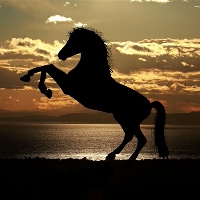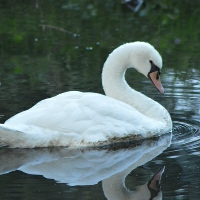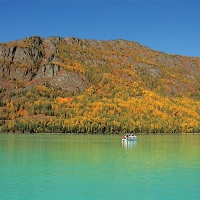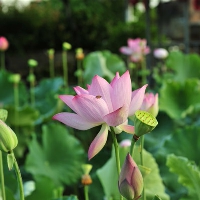The Boy Who Loved Bears
a long time ago a pawnee hunter was returning home after a day's hunting when he saw a baby bear all alone in the forest.
the bear cub1 looked very frightened and was crying for its mother.
feeling sorry for the bear cub the hunter picked it up, held it in his arms and gently stroked its fur.
“did you lose your mother little one?” said the hunter as he stroked the fur under the cub’s chin.
the cub began sucking on the hunter’s finger.
“i think you’re hungry too,” said the hunter. he reached into his bag for the last of the food his wife had given him that morning, and fed the cub.
as he held the cub in his arms, the hunter thought about his pregnant wife and the baby they were expecting any day now.
“little one,” he said to the cub. “if ever my son or daughter is alone, i pray there will be some one there to help them, like i have helped you.”
the hunter put the bear cub down, then tied a small medicine bag filled with sacred leaves around its neck as protection. the cub curled into a ball on the ground. the hunter stroked the cub’s fur until it fell asleep, purring.
the hunter covered the little bear with leaves to hide it.
“sleep well, little one. i pray your mother will return by the time you wake up,” whispered the hunter to the sleeping cub.
when he returned to his village the hunter told his wife about the little bear.
“that’s really strange,” said his wife. “i saw a bear today too.”
a few days later when their son was born they decided2 to call him little bear.
as the years passed, little bear grew into a strong young man. he became the best hunter in the village. he could track animals just like a bear, and catch fish in the streams, just like a bear.
“he even growls3 like a bear when i try to wake him in the morning,” said little bear’s mother.
often the young hunter would go and sit quietly, praying for hours where the bears were known to live.
“i get this really weird4 feeling when i’m sitting there praying,” little bear said to his father. “it’s as if i can feel the power of the bears.”
one day when little bear and other young men from the village were out hunting, braves from another tribe attacked them.
little bear and the young men from his village fought bravely but they were outnumbered. the battle continued until little bear and his friends lay dead.
soon after the battle had finished a bear and his mate came upon the horrible scene.
the female bear
recognised little bear.
“look, that is the young man who prays for us. we have to help him!” she said to her husband.
‘i can’t,” said her husband. “my healing medicine only works in the light. the clouds are stopping the sun from shining its light on us.”
just then the clouds parted and little bear was bathed in a single ray of sunlight.
the bear stood tall, raised his arms to the sky and cried. “oh, great spirit! i ask you to return life into the body of this young man.”
the bear continued praying and slowly the life-spirit returned to little bear.
the bears gently picked little bear up and took him to where they lived. little bear stayed there for many months, until he was healed.
when little bear was well the bear walked with him to the top of a hill overlooking little bear’s village.
the bear held little bear's hands in his mighty5 paws and breathed his spirit into him.
“we are brothers now, and are as one” said the bear. “whatever happens to me will happen to you, and whatever happens to you will happen to me.”
little bear became an even greater hunter and held bear ceremonies to heal others and to give thanks to the great spirit for the bear. as he grew older little bear changed his name to bear man.
bear man passed on the power of the bear to his children and grandchildren. they passed it on to their children, so even today the power of the bear is still known to the pawnee people.
after many years, bear man died peacefully in his sleep. it is said that an old bear died at that very instant.
the two brothers were together again.
the end
 高山与森林 2024-04-17 14:59:23
高山与森林 2024-04-17 14:59:23









